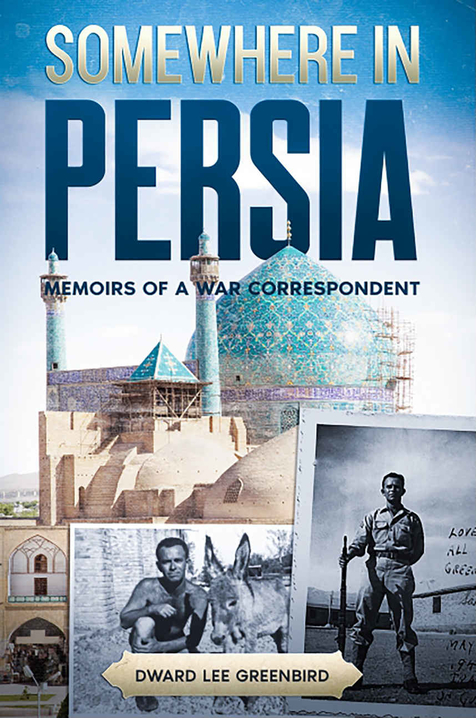
The observations, writings, poems, photos and jokes created by his father, Sam Greenberg, in service overseas in World War II fill the highly readable biographical portrait by author Dward Lee Greenbird, Somewhere in Persia: Memoirs of a War Correspondent.
Greenberg, born in 1912, was a newspaper staff writer when the war broke out, enlisted and became a war correspondent stationed in an army garrison on the Persian Gulf in Iran. Described by his son as a “happy guy,” Greenberg saved and sometimes sent home photos of the foreign countries he inhabited or visited. The material in this memoir comes from scrapbooks created between 1930 and 1948.
The opening piece is especially indicative of Greenberg’s inner strength of character, dealing with a thorny subject – anti-Semitism. Published in 1938 in the Miami Tribune, it predicted hopefully that because of America’s role as the Melting Pot for immigrants from all over the world, it could both provide acceptance for Jewish people and an entryway into marriages between Jews and Gentiles. Interestingly, Greenberg cites the Ku Klux Klan as one of the villains in some instances of anti-Semitism, but opines, “Few take it seriously.” In this way, the book becomes not only a personal memoir, but a portrait of an era.
Greenberg’s hearty sense of humor is evident throughout this collection. For army publications he wrote such satirical pieces as “Boys, Meet the Messer-Upper” – a guy who will nearly always “fall out without overseas cap or fatigue hat,” and has trouble brushing his teeth, shaving, and handling food. His communications to family back home include sweet pictures for Mother’s Day, photos of army commemorations of important Jewish holy days, and general descriptions of his daily activities in Iran, where soldiers could find themselves knee-deep in mud during the rainy season or facing temperatures up to 170°. He assures family that he has plenty of American candy, and gives thanks for America accompanying the photo of an especially poor Persian city street scene. On one furlough, he visited Israel and took photos of sites important to Judaism, Christianity, and Islam.
With photos on almost every page, and his father’s writings from newspapers and family letters, Greenbird has created a dynamic sense of who Greenberg was: intelligent, open-minded, and always ready to amuse or be amused, even amidst the war’s grimness. Iran was a critical American outpost in WWII, protecting oil resources for the use of our Russian allies against the planned (but never executed) incursion by the Nazis. So though he was not on the fighting front, Greenberg’s work was needed and meaningful; his son has aptly and amply provided his legacy.
Greenbird, an artist and self-described participant in the New Age Movement, sees many similarities between his father and himself, crediting Greenberg with recognizing his artistic bent when the boy was just three. In a final section, “Prayers for our World,” Greenbird includes statements of spiritual guidance from diverse sources, echoing his father’s ability to see the good in other cultures and religions, aptly summing up the book’s sense of openness and hope.
A fascinating and moving tribute, Greenbird’s book combines a family treasury of memories with some pertinent historical and socially relevant observations, resulting in a positive message of courage and tolerance for all.
Book Links
STAR RATING
Design
Content
Editing
Get an Editorial Review | Get Amazon Sales & Reviews | Get Edited | Get Beta Readers | Enter the SPR Book Awards | Other Marketing Services























Leave A Comment